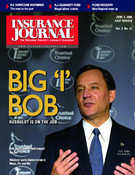e_6_ednotes.xtg
@IJ_East_Blue=[C]<"CMYK",N,P,N,1,0.7,0,0>
Imagine spotting a swimmer in the Charles River or finding an empty parking space in Boston. If you succeed, you could have what it takes to be Massachusetts insurance commissioner.
Each year since 1977, the Massachusetts insurance commissioner has had the option of moving the price-controlled state’s auto insurance system towards competitive rating rather than continuing with state-set rates.
But first, she has to conclude that there is sufficient competition within the current marketplace to support a switch to competitive rates.
Thus she is forced to look under rocks, behind bushes and inside caves to find competitive life in a system that has for almost 30 years suffocated it. She must find competition where little if any meaningful competition exists.
Kevin Beagan, director of the State Rating Bureau within the Division of Insurance, notes that while neighboring states have more than 100 auto insurers, the Bay State has fewer than 20. Glenn Kaplan, assistant attorney general, adds that the top three companies write nearly 50 percent of the market and the top eight, about 80 percent.
Most commissioners are not magicians who with a wave of a wand can make things appear out of thin air. Thus it is no wonder that since 1977, every commissioner, whether appointed by a Democratic or Republican governor, has found insufficient competition and set rates again. Most years, even the industry itself has reluctantly agreed with these decisions.
Each year there are arguments that other changes to the complex system must be made before a switch to competitive rating should be attempted. Most of these changes concern the nature of the residual market, the built-in subsidies for certain inexperienced and urban drivers, and controls on criteria that could be utilized by insurers if they were free to set their own rates.
Current Commissioner Julianne Bowler has made more progress than her predecessors in making changes that pro-competition forces want, including reforming the residual market and altering subsidies. But some think she exceeded her authority in trying to implement an assigned risk plan so that change has been held up in court.
Few question that the commissioner has the authority to switch to competitive rating. But like so many things, timing is everything.
The Legislature is about to consider legislation that would introduce competitive rating and some of the other changes sought. If they act before they adjourn on July 31, lawmakers might give Bowler the framework she needs to build a better system.
If, however, they again refuse to endorse a competitive system, Massachusetts could very well find itself with even less competition next year, if that’s even possible.
But anything is possible. The state is actually reviewing plans for a swimming competition in the once dangerously-polluted Charles River.
Parking in Boston remains a problem, though.
Was this article valuable?
Here are more articles you may enjoy.


 Q4 Global Commercial Insurance Rates Drop 4%, in 6th Quarterly Decline: Marsh
Q4 Global Commercial Insurance Rates Drop 4%, in 6th Quarterly Decline: Marsh  Allstate Doubles Q4 Net Income While Auto Underwriting Income Triples
Allstate Doubles Q4 Net Income While Auto Underwriting Income Triples  Zurich Insurance’s Beazley Bid Sets the Stage for More Insurance Deals
Zurich Insurance’s Beazley Bid Sets the Stage for More Insurance Deals  Former Ole Miss Standout Player Convicted in $194M Medicare, CHAMPVA Fraud
Former Ole Miss Standout Player Convicted in $194M Medicare, CHAMPVA Fraud 


